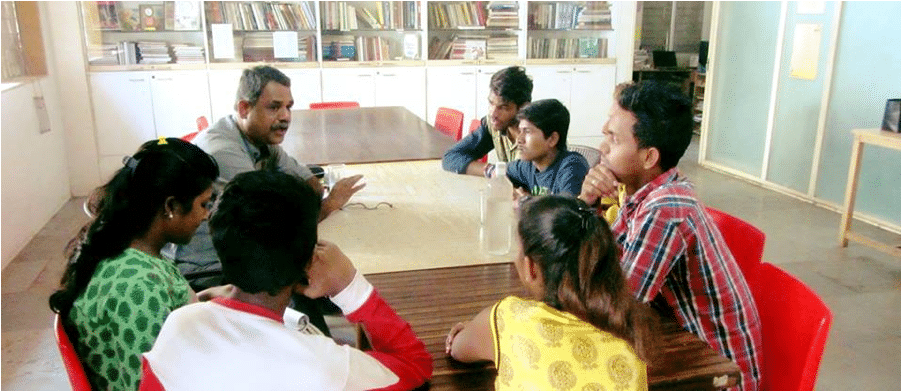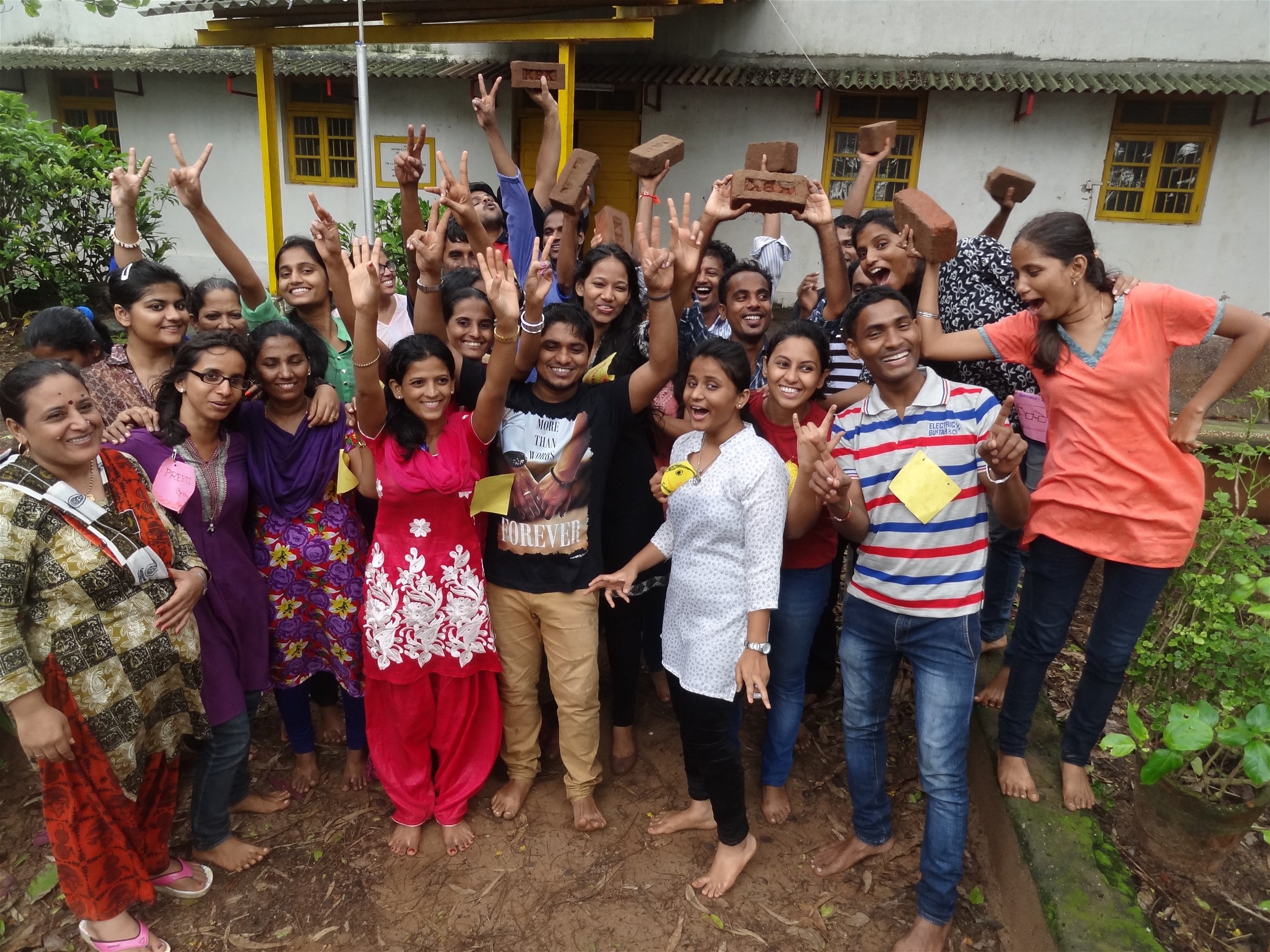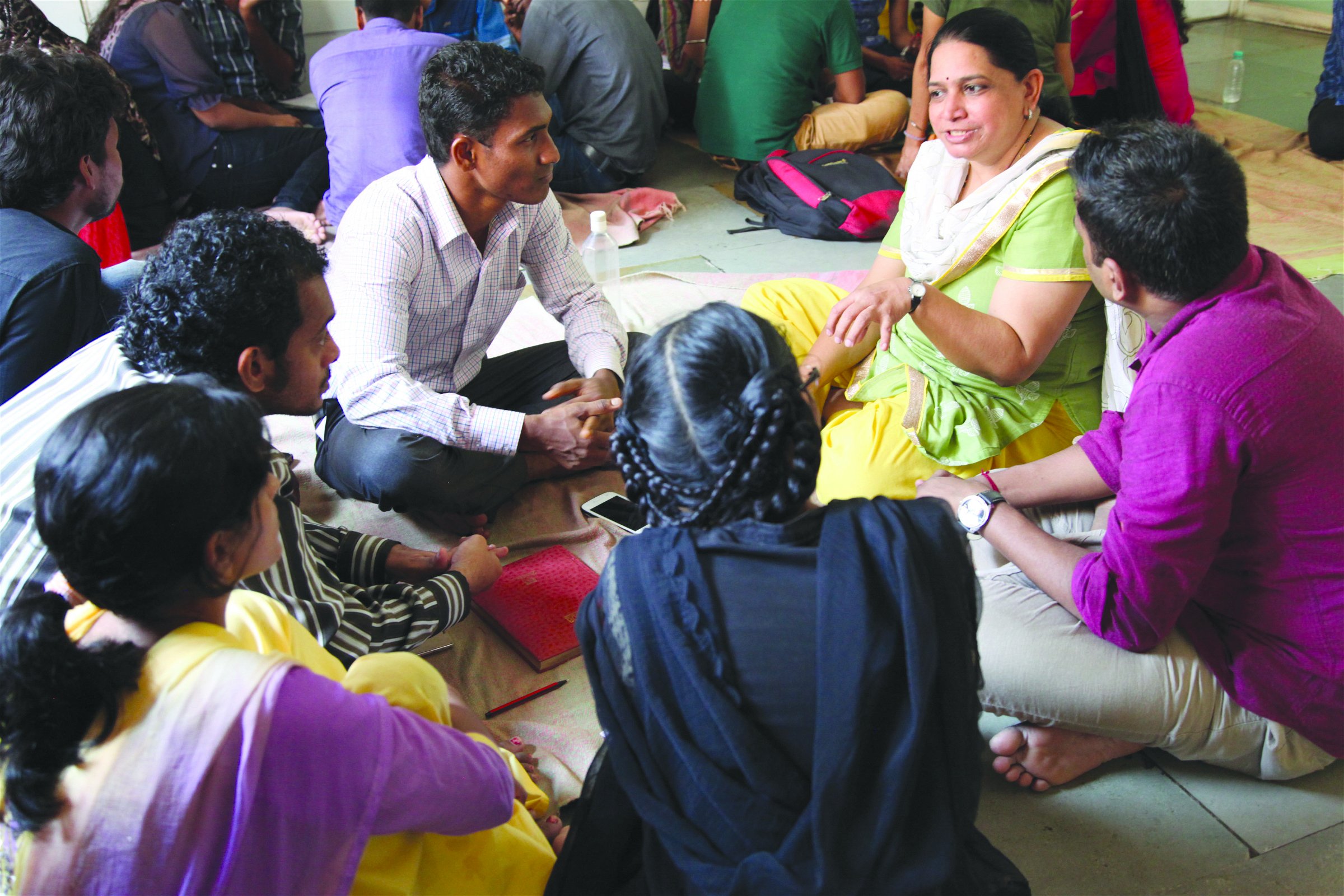Project: Youth Fellowship Program
Location: Mumbai, Maharashtra
Category: Empowerment and Training
Research Leads to Problem Solving
The Youth Fellowship, PUKAR’s flagship program, is “an 11-month engagement that seeks to empower youth from underserved communities with the tools of Community-Based Participatory Action Research for action, intervention, and advocacy.” Fellows are marginalized youth who become repositories of local knowledge and then informed stakeholders. This process creates “a level playing field for the youth who become change makers in their communities.”
Two groups of youth fellows benefited from IDS funding in 2017:
Impactpreneur
Three of the five members of this group are social work students; the other two work in the development sector. The fellows want to explore the self-help group model of the women in M-East ward (an area of Mumbai that has consistently recorded the lowest HDI* for the city) with a special focus on jewelry/accessory manufacturers. The group will research the challenges faced by these women in a competitive market and track the influence of the community environment on their business. The goal is to understand the reasons for the success or failure of these businesses.
*HDI (Human Development Index), a metric developed by the United Nations, takes into account a person’s life expectancy at birth, years of schooling, and standard of living (as measured by gross national income per capita).
Girls for Change
The seven members of this group are aspiring dentists in the final phase of their graduate studies (a course that requires internship at a dental practice). Girls for Change has chosen to research the waste segregation system of dental clinics in Mumbai and Navi Mumbai and to examine the dangers posed to workers who handle and transport biomedical waste.
The orientation program included workshops on social realities (including issues like caste, religion, gender, and social justice) and on the self (prompting introspection and emotional connection). During field visits, fellows saw real-world physical manifestations of injustice. During one field visit, fellows participated in a rally to respect gender diversity organized by Men Against Violence and Abuse (MAVA). In the workshop on governance that followed, fellows were introduced to the CBPAR (Community-Based Participatory Action Research) tool, research ethics, and research design.
One of the challenges the program faced was attendance (fellows must juggle multiple commitments outside the fellowship, making it difficult for them to maintain a consistent attendance record). Another challenge observed by the facilitators is that a few dominant voices tended to lead discussions, making equal participation by all fellows difficult. There also have been recurring personal conflicts in some groups. The facilitators continue to work on finding solutions to problems like these.
IDS Coordinator: Nila Vora
Project Manager: Dr. Anita Deshmukh
–2017 IDS annual report
The 11th edition of PUKAR’s Youth Fellowship Program enrolled a total of 70 fellows from marginalized communities and low-income colleges across the city of Mumbai.
Tata Institute of Social Sciences (TISS), a premier social science institute in India, now accredits PUKAR’s youth fellowship program. Starting this year, the fellows will receive a certificate from TISS upon successful completion of their fellowship.

This year, a total of eight groups embarked on a journey researching diverse issues related to their daily lives. The range of topics included:
Women’s safety on public transport: Using community mapping as their preliminary research tool, this group created a map of the routes between colleges and the train stations closest to them. The group conducted in-depth interviews with 40 students as they sought answers to why women’s mobility is still a matter of concern today and how this threatens their access to education and employment opportunities.
Sexual harassment in higher education: Through a survey of 100 female students and interviews with professors, this group wanted to juxtapose the countless experiences of women that fall within the definition of “sexual harassment” and the role colleges play in mitigating these experiences and preventing their occurrence.
Restricted Internet access for girls: This group decided to explore ways in which Internet usage patterns of females are regulated by their families and relatives. The group hopes to illuminate the penetration of gender politics into the fabric of the Web and to examine technology alongside regressive gender norms to see if girls actually enjoy autonomy while using the Internet.
The realities of child labor in three communities: Child labor is obviously wrong, and it has to stop, thought this group. But their research uncovered the complexity of the issue. Workshops and field visits helped to reveal the factors that motivate children to take up paid work.
Why is there a water shortage in Shanti Nagar? This group looked at the reasons behind Shanti Nagar’s water shortage to discover the implications for the heath and education of the community.
These research topics have deep connections with the young researchers’ daily struggles, hopes, dreams, and aspirations. With continued support from IDS, the journey of unlearning-learning-relearning in PUKAR’s Youth Fellowship Program has become more intense and rewarding. In five months, 20 workshops have been successfully completed, and all the groups went into their respective field areas for data collection. In early 2017, workshops related to data analysis, report writing, and advocacy were conducted. The program culminated with a Graduation and Exhibition event in June 2017.
IDS Coordinator: Nila Vora
Project Manager: Dr. Anita Deshmukh
–2016 IDS annual report
With IDS’s support, PUKAR’s “Barefoot Researchers for Better Communities” project began in July 2015 when 40 marginalized young people gathered into working groups. They attended numerous training sessions and focus groups throughout the year to learn techniques in money/people management and team dynamics and to improve their research and communication skills.
One of the groups, Swaradhar (which means “with the support of music” in Marathi), studied issues of dignity and livelihood in Mumbai’s blind and visually challenged street musicians. These musicians, though often highly skilled and professionally trained, have been forced to earn their living through a combination of begging and performing for alms on local train platforms. Another group, Swayam (“ourselves”), studied the plight of sex workers in Mumbai.
Using Community-Based Participatory Action Research (CBPAR) as a tool for community development, these young researchers conducted interviews with their subjects. They documented issues encompassing all aspects of the lives of their respondents and partners from various marginalized communities. Later, these young people analyzed the data they’d collected in order to come up with locally-based solutions.
In this rigorous year-long process, the young people learned not only the techniques of data collection, critical data analysis, and problem solving; they also learned to appreciate “soft skills” like teamwork, transparency and accountability, and respect for diversity. They practiced building consensus and implementing solutions locally to bring about change.

All did not go smoothly for the groups! The members of Swaradhar, after bringing together a group of the blind artists who sing and play instruments on various local train platforms, struggled to teach them how to overcome their feelings of shame when narrating their life stories. The Swayam group members had to conquer their own fear and shame in order to step inside the environment of sex workers and interview them. It took great self-confidence and conviction on the part of these young people to realize that even sex workers and blind artists have as much right to the city as they do themselves!
So what was the outcome? In the end, IDS helped 40 young people from marginalized communities and vernacular backgrounds to become change-makers for their communities, to learn to take community members along in the process and work in groups towards building an inclusive community. They also learned to be conscious, informed, and contributing citizens who can be the leaders of tomorrow.
–2015 IDS annual report
PUKAR is an independent research collective and urban knowledge production center based in Mumbai. With financial support from IDS, PUKAR aims to democratize research and broaden access to knowledge among disenfranchised citizens.
The Youth Fellowship, PUKAR’s flagship project, is a unique knowledge initiative that provides a space for the critical engagement of youth and focuses on transforming the quality of life in Mumbai. The program uses research as a pedagogical, interventional, and advocacy tool to empower youth from marginalized communities to negotiate the city and explore the social, cultural, economic, and political aspects of their neighborhoods.

In 2013, India Development Service (IDS) and PUKAR came together for an event that showcased the journeys undertaken by Barefoot Researchers. In 2014–15, PUKAR partnered with IDS to launch its tenth edition of Barefoot Researchers for Better Communities.
The program began with outreach activities that connected community-based organizations with communities of former members of the youth fellowships. Four groups were organized during the process:
The Swaradhar group organizes a band of street artists who perform in trains and provides them with viable alternatives and additional sources of livelihood. However, the group’s primary concern is to understand why these street artists are identified as beggars rather than as artists. This group will study the lives of the artists to understand how notions of respectability are articulated in various contexts.
The Matunga group is interested in understanding the efficacy of the system in place at their college that segregates vernacular medium and English medium students. While exploring issues faced by the vernacular medium students, this group also wants to examine the impact of such a system on students’ confidence levels.
The third group, Swayam, is a group of paraprofessionals trained in social work. The group works to understand the politics of stigma attached to spaces, such as the red light district of Kamathipura, and the consequences on its residents. Their interest in the topic was prompted by the experiences of some Swayam members who are social workers based in red light districts.
Parivartan, made up of social work paraprofessionals from Nirmala Niketan College of Social Work, is doing exploratory research into the leadership development processes of grass-roots level social workers. The members of the group drew upon their own social work experiences to reflect on why the contributions at the grass-roots level are not adequately recognized. Through their research, they hope to determine how grass-roots level social workers can overcome the odds they face and bring about change in their respective fields.
–2014 IDS annual report
PUKAR Urban Youth Engagement
One disenfranchised group that PUKAR serves is the youth of Mumbai. India is a young country; two-thirds of its population is under 35 years of age, and one-third of those are under 25, resulting in a deep demographic dividend.
PUKAR Monsoon started on August 11, 2013 at Akshara, an organization working towards gender equality, and continued over the course of three months, concluding with a public event on October 26 at Studio X, Fort, Mumbai. Eleven events were conducted in various communities and colleges around the city. The colleges turned out to be ideal settings to engage an 18–21-year-old audience at a critical point in their lives.
PUKAR Monsoon was also organized in several NGOs, attracting many community members who demonstrated an interest in the project and its potential. Organizations that work with marginalized youth had the potential to connect PUKAR’s Barefoot Researchers with other youth of the city, especially early dropouts who cannot be reached through educational institutions.
Based on the feedback collected, the events were a resounding success. For instance, as a student at Ruparel College observed,
“it is commendable that these girls, who are not even formally graduated, are standing here and giving a presentation. Even I cannot do it.”
–2013 IDS annual report

